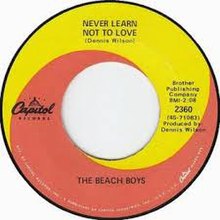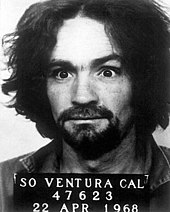Never Learn Not to Love
| "Never Learn Not to Love" | ||||
|---|---|---|---|---|
 | ||||
| Single by the Beach Boys | ||||
| from the album 20/20 | ||||
| A-side | "Bluebirds over the Mountain" | |||
| Released | December 2, 1968 | |||
| Recorded | September 11, 16–18, 1968 | |||
| Studio | Beach Boys, Los Angeles | |||
| Length | 2:08 (single version)[1] 2:31 (album version)[2] | |||
| Label | Capitol | |||
| Songwriter(s) | Dennis Wilson | |||
| Producer(s) | Dennis Wilson | |||
| The Beach Boys singles chronology | ||||
| ||||
| Licensed audio | ||||
| "Never Learn Not to Love (Remastered 2001)" on YouTube | ||||
"Never Learn Not to Love" is a song recorded by the American
Manson attended but did not participate in the recording of "Never Learn Not to Love", held at
In February 1969, an extended edit of "Never Learn Not to Love" was included on the Beach Boys' album
Background

In late spring 1968,
Manson discussed and presented Wilson some of his self-penned material, and in exchange, Wilson paid for studio time to record songs performed by Manson.[citation needed] That summer, Manson booked a session at Brian Wilson's home studio for several tracks that were co-produced by Brian and Carl Wilson.[5] Much of the recordings were not demos, but rather polished studio productions of songs that possibly included "Cease to Exist". These recordings remain unheard to the public.[6]
Composition and authorship
According to Manson, he had penned "Cease to Exist" specifically for the Beach Boys to record. He explained, "[The Beach Boys] were fighting amongst themselves, so I wrote that song to bring them together. 'Submission is a gift, give it to your brother.' Dennis has true soul, but his brothers couldn’t accept it."[7] Manson Family member Squeaky Fromme said of the song, "Charlie made up a song for Dennis, and we wrote down the words. Part of it was from a man to a woman, and part from a man to his brothers."[8] Fromme added, "Dennis would later talk the Beach Boys into recording the song, but someone would talk him into changing the rhythm and words, and failing to even mention Charlie."[8] Mike Love claimed that he was not aware of the song's author at the time, and assumed that Dennis had written it.[9]

Manson was not given a label credit for the song. In exchange for the publishing rights to "Cease to Exist", he received a sum of cash and a
The band reworked the song's
The lyrics were partially altered (the opening line "Cease to exist" modified to "Cease to resist"), and the title was changed to "Never Learn Not to Love", much to Manson's indignation.[13][14] Manson threatened Wilson with murder for changing the lyrics.[16] Gregg Jakobson remembered, "Charlie always said, he just asked one thing, he said to me, 'I don’t care what you do with the music. Just don’t let anybody change any of the lyrics.' That was one of his big beefs with Dennis. Dennis had taken some of his songs and changed the lyrics around, which really infuriated him."[17] After realizing Manson's growing erratic behavior, Wilson ended his friendship with him soon after.[18]
Recording
The Beach Boys recorded "Never Learn Not to Love" at their private studio on September 11 and 16–18, 1968.
Release and reception
It's probably the strangest record The Beach Boys have ever made. It really is so odd, disjointed and confusing. I can only see it being a hit because they're here in person [on a tour].
—Reviewer
"Never Learn Not to Love" was released as the
In his retrospective assessment of the song, Richie Unterberger commented "Never Learn Not to Love" is far more notorious for its relation to Manson, not the music itself which he describes as "average".[24] Colin Larkin, in The Encyclopedia of Popular Music, wrote the track "had the ironic distinction of putting Charles Manson in the charts".[25] Journalist Nathan Jolly called the song "softer but still eerie", also noting how fans of the Beach Boys who listened to the song over the years "had no idea of the inherent evil of its actual composer".[26]
Lie: The Love and Terror Cult version
During Manson's trial for the murders of seven people, his debut album, Lie: The Love and Terror Cult, was released in March 1970. Consisting of 13 tracks recorded between 1967 and 1968, it included Manson's original arrangement of "Cease to Exist".[27][28]
In an AllMusic review of Manson's album, his rendition of "Cease to Exist" was regarded by Theodor Grenier as "one of Manson's signature performances, and has justifiably invited comparison with Jim Croce and José Feliciano".[27] Critic Michael Little considers Manson's version superior to the Beach Boys', having praise especially for Manson's vocals: "you expect a tattered, raw, and raggedy voice, with a touch of lunatic rage, but what you get is a smooth-voiced folk singer".[29] He also wrote that Manson's raw, stripped-down take "gives the song an impressive lo-fi immediacy that is a million miles away from the Beach Boys' treatment".[29]
Personnel
Per Craig Slowinski.[30]
The Beach Boys
- Al Jardine – backing vocals
- Bruce Johnston – backing vocals
- Mike Love – backing vocals
- Brian Wilson – backing vocals
- Carl Wilson – backing vocals, bass, guitar
- Dennis Wilson – lead and backing vocals, piano
Session musicians
- John Guerin – drums, percussion, sleigh bells
- Don Randi – piano, organ
- upright bass
Cover versions
- 1994: Sean MacReavy, Dumb Angel
- 2020: Psychic Ills, Never Learn Not to Love / Cease to Exist 7" single
See also
| External videos | |
|---|---|
References
- ^ "The Beach Boys Never Learn Not to Love". Swiss Charts. Retrieved February 4, 2017.
- ^ a b Leaf, David (1990). Friends / 20/20 (CD Liner). The Beach Boys. Capitol Records.
- ^ Love 2016, p. 208.
- Consequence of Sound. Retrieved June 17, 2018.
- ^ Badman 2004, p. 222.
- ^ Doe, Andrew. "Unreleased". Endless Summer Quarterly. Retrieved January 8, 2017.
- ^ Webb 2001, p. 81.
- ^ a b Fromme 2018, p. [page needed].
- ^ Kraps, Daniel (March 17, 2017). "How a Stolen Beach Boys Song Helped Lead to Charles Manson's Murderous Path". Rolling Stone.
- ^ Sanders 2002, p. 64.
- ^ Nolan, Tom (November 11, 1971). "Beach Boys: A California Saga, Part II". Rolling Stone.
- ^ a b c d Desper, Stephen (2017). "Response to inquiry on recording Charles Manson". Mansonblog.com.
- ^ a b Carlin 2006, p. 138.
- ^ a b McKinney 2003, p. 284.
- ^ Sharp, Ken (July 28, 2000). "Alan Jardine: A Beach Boy Still Riding The Waves". Goldmine.
- ^ Sanders 2002, p. 261.
- ^ Felton, David; Dalton, David (1970). "Charles Manson: The Incredible Story of the Most Dangerous Man Alive". Rolling Stone.
- ^ Webb, Adam (14 December 2003). "The Lonely One". The Guardian. Retrieved January 8, 2017.
- ^ "Recordings sessions: 1968". Endless Summer Quarterly. Retrieved January 8, 2017.
- ^ Hermes, Will (January 2019). "How the Beach Boys' Lost Late-Sixties Gems Got a Second Life". Rolling Stone.
- ^ a b Badman 2004, p. 232.
- ^ Schmidt, Arthur (April 19, 1969). "The Beach Boys: 20/20". Rolling Stone. Retrieved January 8, 2016.
- ^ Badman 2004, p. 242.
- ^ Unterberger, Richie. "20/20 – Review". AllMusic. Retrieved January 9, 2017.
- ISBN 978-0-85712-595-8.
- ^ Jolly, Nathan. "The Beach Boys and Charles Manson". News.com.au. Retrieved January 9, 2017.
- ^ a b "Lie: The Love and Terror Cult – Review". AllMusic. Retrieved January 7, 2017.
- ^ Lofton, Daniel (6 March 2015). "How Charles Manson's Music Finally Saw the Light of Day". Ultimate Classic Rock. Retrieved January 8, 2017.
- ^ a b Little, Michael (August 2014). "Graded on a Curve: Beach Boys "Bluebirds over the Mountain" b/w "Never Learn Not to Love"". The Vinyl District. Retrieved January 9, 2017.
- ^ Slowinski, Craig (Spring 2019). Beard, David (ed.). "20/20: 50 Year Anniversary Special Edition". Endless Summer Quarterly Magazine. Charlotte, North Carolina.
Bibliography
- Badman, Keith (2004). The Beach Boys. The Definitive Diary of America's Greatest Band: On Stage and in the Studio. Backbeat Books. ISBN 0-87930-818-4.
- ISBN 1-59486-320-2.
- Fromme, Lynette (2018). Reflexion (Kindle ed.). The Peasenhall Press.
- ISBN 978-0-698-40886-9.
- McKinney, Devin (2003). Magic Circles: The Beatles in Dream and History. Harvard University Press. ISBN 978-0-674-01202-8.
- ISBN 1-56025-396-7.
- Webb, Adam (2001). Dumb Angel: The Life & Music of Dennis Wilson. Creation Books. ISBN 978-1840680515.
External links
- Cease to Exist: The Saga of Dennis Wilson and Charles Manson – compendium of first-hand accounts edited by Jason Austin Penick
- Never Learn Not to Love (Track And Backing Vocals) on YouTube
- Never Learn Not to Love (A Cappella) on YouTube
- Never Learn Not to Love (Sean Macreavy version) on YouTube


